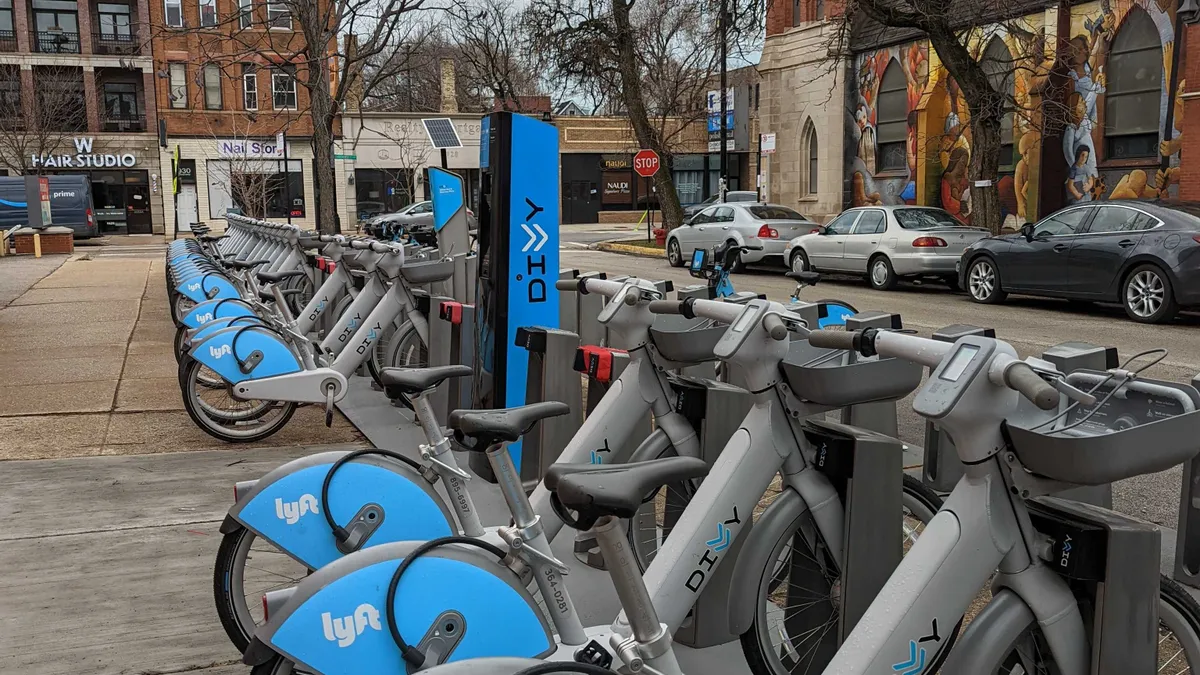Dive Brief:
- Chicago's Divvy bike-share program, owned by the Chicago Department of Transportation and operated by Lyft, installed what the city says are the nation's first on-street charging stations for shared e-bikes. They will work with Lyft's newer e-bike model, which it released in December.
- The charging stations will increase e-bike availability while reducing the bike-share program's greenhouse gas emissions, the city says.
- Five charging stations are in place, and the pilot program will expand throughout the city this year to eventually include 110 stations, CDOT said.
Dive Insight:
Chicago's new charging stations aim to ease e-bike availability challenges that result from drained batteries. Most bike-share programs swap out depleted batteries with charged ones. But that doesn't always happen often enough throughout the day to ensure all the e-bikes in a fleet are ready to go.
Prior to the introduction of removable batteries in the last five years, shared e-bikes were collected and transported via van or truck to a charging location. That practice still is prevalent, not just for charging, but also for repositioning bikes from full stations to meet demand at stations where supply is low.
Moving the bikes by gasoline-powered vehicle is an emissions-intensive practice for a concept that, ironically, is aimed at reducing vehicle use and emissions. On-street charging is a more sustainable approach that cuts the system's van and truck use.
"There's no perfect system that rebalances itself," said Sean Wiedel, CDOT assistant commissioner. "The carbon footprint of battery swapping is certainly lower than rebalancing. But what we wanted to do is get to a place where we can lower that even further by having charging stations so nobody has to go and swap batteries at all — or at least we can reduce the number of battery swaps."
Solar charging is a next-generation option for shared e-bikes that would further decarbonize the industry. So far, solar-powered chargers are only being tested domestically in small-scale pilot projects, such as WE-cycle's programs last year in Aspen and Basalt, Colorado.
Many bike-share programs already incorporate solar technologies to fully or partially power their bike-docking kiosks, but those stations are not designed to generate enough power to charge e-bikes, said Colin Murphy, director of research and consulting at the Shared-Use Mobility Center. Installing and expanding the electrification infrastructure to provide that greater capacity will be key for successful e-bike charging station implementation, Murphy said. He notes the importance of bike-share program operators working with the local power utility on permitting and potentially intrusive construction, like trenching or boring, to install new power connections.
"You definitely need a utility connection. That's always complicated," Murphy said.
Programs could achieve economies of scale by coordinating with utilities and stakeholders for other future electrification needs.
"I think it would be great — if this [charging station pilot] turns out to be something that works — if it can go hand in hand with the rollout of more electric vehicle car charging," Murphy said. "While the utilities are doing these sorts of make-readies and expansions and building power in other places, they can build into it expansion plans for EVs and bike-share."
CDOT and Lyft worked with Chicago utility Commonwealth Edison Co. for permitting and tapping into the power grid to electrify the initial five stations. New York's Citi Bike, which Lyft also operates, has been in talks with the city's Department of Transportation and utility Consolidated Edison Co. to figure out how it could electrify docking stations to accommodate e-bike charging, but so far it hasn't launched a charging station initiative.
Lyft and CDOT chose the Chicago stations to electrify mainly based on which had the highest ridership and could further benefit from fewer rebalancing vehicle trips. During the pilot, they will gather data to determine future expansion plans or program alterations.
"We wanted to have charging stations that are widely and heavily used so we could get a good, robust set of data," Wiedel said. "For the remaining 105 stations, we'll probably tweak our criteria."
The Divvy system has a total of about 800 docking stations. When CDOT amended the Divvy contract with Lyft in 2019, it tried to be forward-thinking in anticipating bike-share evolutions, including e-bikes, Wiedel said. One of the ancillary perks of electrifying docking stations they identified is the ability to add digital ad panels, as opposed to the current static ad panels.
Although Chicago appears to be the first large, municipally-tied program to install on-street e-bike chargers, this idea has been tested before. Four years ago, Uber announced it would install public charging stations for its Jump e-bikes as a move to boost sustainability, and charging stations popped up in Sacramento, California, and Austin, Texas. Lime acquired Jump from Uber in 2020.












